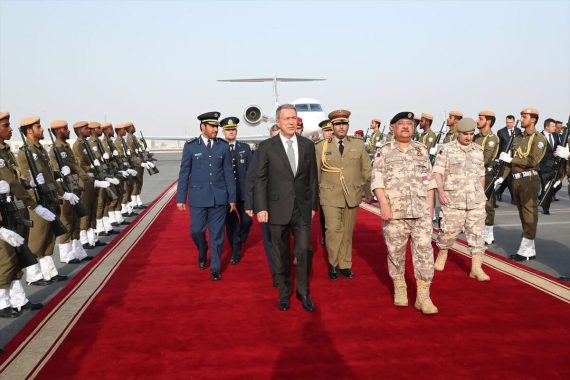The political invalidation of the Arab world has been one of the most important consequences of the recent developments in the Middle East. It seems that Gulf countries seem to have no strategy for dealing with Iran, and they are short-sighted in not supporting Turkey, even though Turkey is the only country capable of pushing back against Iran in the region.
The Gulf has always been a sub-region that characterized the scattered nature of the Arab world. The Arab Spring caused a political rift among Gulf countries, which took varying approaches to the crises and actors shortly after they emerged. This rift deepened after the 2013 military coup in Egypt and evolved into a full-blown crisis in 2014. The conflict between Gulf countries reached its peak in mid-2017 as the trio of Saudi Arabia, United Arab Emirates (UAE) and Bahrain enforced a diplomatic, political and economic embargo on Qatar.
Oman continues to maintain its non-conflictual foreign policy, and Kuwait too has a relatively neutral stance. Qatar, on the other hand, represents the opposition against the UAE-Saudi Arabia coalition. While Qatar and Turkey usually act in unison, backed by the US and Israel, UAE and Saudi Arabia along with Egypt pursue policies against Turkey and Qatar. These two parties step on each other’s toes when it comes to nearly every issue existing in the Middle East.
Their approaches to Turkey’s Operation Olive Branch (OOB), launched on January 20 with the aim of eradicating terrorist elements from the border, are also similar. In this respect, Turkey’s military operation has caused the schisms between the Gulf countries to resurface once again. Right after the initiation of the operation, Turkey invited the ambassadors of Saudi Arabia, Kuwait and Qatar, along with other respective countries’ diplomats residing in Ankara, to the Ministry of Foreign Affairs and briefed them about the operation, in an effort to win their support.
Same old story in the Gulf
Despite the briefing, especially Saudi Arabia and UAE stood against Turkey’s OOB. Allegedly enforcing the regional policies of the US and Israel, the leadership of these two countries continued to be in close relations with Washington and Tel Aviv. As it was also the case with the previous operation, Brett McGurk, the most prominent US official responsible in Syria and a fervent supporter of the PKK/YPG, met with representatives from the UAE and Saudi Arabia during his visit to Abu Dhabi. Egyptian and Israeli representatives were also present at this meeting. These four countries are known for their anti-Turkey policies in the region. In one of his previous statements, McGurk had alleged that the operation would rejuvenate Daesh in Syria.
Being the most fervent anti-Turkey Gulf country, the UAE described the operation as an infringement on Syria’s sovereignty. UAE Foreign Minister Anwar Gargash went further by saying through social media that the operation was a threat to the security and unity of Arabs.
Gargash tweeted “the developments regarding Afrin created the need to redefine and restore Arab national unity.” Thus, he claimed that inaction would lead to the marginalization of Arabs in the region, and tried to rally the Arab public against Turkey.
With the influence of the UAE and Saudi Arabia, Egypt under the Sisi administration described the operation as an assault on Syria’s security. In its statement, the Egyptian Ministry of Foreign Affairs alleged that OOB was undermining the political resolution efforts in Syria along with infringing on political agreements.
Recommended
Moreover, officials of both the UAE and Egypt responded positively to the PYD/YPG’s call for support. Their reactions could be seen as the continuation of the US and Israeli sustenance to the terrorist organization. Meanwhile, this should be regarded as an attempt to consolidate the new divide in the region. Considering these statements, the YPG is hopeful of receiving military and financial support from the UAE and Egypt.
It’s known that Saudi Arabia has a similar perspective. After Raqqa was recaptured from Daesh and the city was razed to the ground by the US in late 2017, reports about Saudi Arabia sending a representative to the annihilated city and promising $1 billion to the US’ new ally the YPG for reconstruction were leaked. Despite all this, Turkish President Erdoğan called Prince Salman of Saudi Arabia, the ruler of the largest and most important Gulf country, and exchanged opinions about the aim of the operation and expectations. According to Anadolu Agency, Erdoğan announced that Turkey would allow the gradual return of Syrian refugees in Turkey to the liberated towns. During the call, both leaders underscored the importance of preserving Syria’s territorial integrity and developing a political resolution to the conflict.
Qatar continues to support Turkey
Ostracized by other Gulf countries, especially Saudi Arabia and the UAE, Qatar continued to side with Turkey, which has been the case since the beginning of the Syrian crisis. Declaring its support for Turkey’s OOB, Qatar described the operation as a necessity in terms of assuring national security. In his statement, Qatari Foreign Minister Sheikh Mohammed bin Abdulrahman Al-Thani asserted that developments in Syria were a direct threat to Turkey’s national security and announced his country’s support for all countries like Turkey who seek to preserve their own national security.
The Qatari Foreign Ministry Spokesperson Lulwah al-Khater announced “Qatar’s support to Turkey initiative which aims to preserve national security and prevent terrorist attacks.” Al-Khater also expressed that OOB was legitimately launched by Turkey to preserve Syria’s territorial integrity along with national security concerns.
Qatari media followed a similar approach and showed support for the operation. For instance, Al-Watan daily reported on the operation with the following title: “Erdoğan: Operation Olive Branch is to eliminate terrorists.” The photo used for this news article had Syrians holding posters that said “We support the Turkish military operation which aims to liberate our people in Afrin from YPG.” The same article also relayed President Erdoğan’s statements which expressed Syria and Turkey’s fates are intertwined, that Turkey wouldn’t be secure unless Syria is secure. Similarly, al-Raya and al-Arab dailies reported that Russia and the US’ reckless policies have forced Turkey to launch the operation and secure its own national security.
Regional crises and the chaos in the Middle East has always forced powers to constantly shift their positions. This creates challenges in maintaining interstate cooperation.
Given that, the OOB has caused some confusion in the Gulf. Anti-Turkey Gulf countries are facing a dilemma in terms of the Syrian crisis. On one hand, they don’t want Turkey to be more active in the region. On the other, they are aware that Turkey is the only country in the region that can counterbalance Iran. They especially know well that Turkey and Iran are waging a proxy war in Syria. Considering both Turkey and Iran, the Gulf countries believe Iran is a larger threat to them; therefore, one would expect them wanting Turkey to be more powerful. However, despite all these factors, the UAE and Saudi Arabia followed a similar policy with Iran, creating one of the most significant paradoxes in recent history, while Kuwait chose neutrality.





